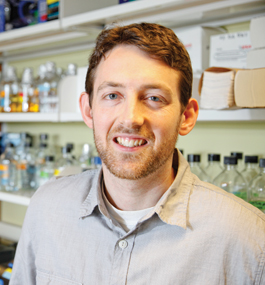To Sleep, Perchance to Learn?

Photo by Mike Lovett
Sleep researcher Christopher Vecsey
by Laura Gardner
Ask a scientist how much we know about sleep, and the answer might be something akin to “about a catnap’s worth.” Still, it doesn’t take a neuroscientist to know that too little time in the Land of Nod wreaks havoc — physically, emotionally and cognitively — leaving in its wake confusion, learning difficulties, memory glitches, grumpiness or worse.
In a 24/7 technologically driven society, the eight-hour rest has gone the way of the rabbit-ear antenna. Now, especially for those who suffer from health conditions that contribute to sleep loss, help may come in the form of a pill, not a pillow.
Sleep researcher Christopher Vecsey, a postdoctoral fellow in the lab of biology professor Leslie Griffith, in collaboration with postdoc Robbert Havekes and biology professor Ted Abel at the University of Pennsylvania, is trying to understand just how the brain copes with the neurochemical fallout caused by too little shut-eye. The goal, says Vecsey, is to develop a treatment that can compensate for the cognitive fuzziness and memory deficits produced by sleep loss in people with insomnia, chronic pain, sleep apnea, or one of the many neurodegenerative or psychiatric disorders associated with disturbed sleep patterns.
If history is any guide, the researchers likely face some sleepless nights in the lab. In the six decades since REM sleep was defined, scientists have grown bleary-eyed probing what happens deep inside the brain during sleep and, its evil twin, sleeplessness. Vecsey and his colleagues are studying the hippocampus, an area of the brain believed to store memories. Using rats as the model organism, they look at how the hippocampus behaves on the cellular and molecular level when it is deprived of sleep.
“We still don’t know exactly what sleep is for, but the brain requires sleep to efficiently establish many forms of long-term memory,” says Vecsey. Scientists believe this is because sleep promotes brain plasticity — the brain’s ability to modulate or alter the number and strength of neuronal connections. “The next step is to find out how sleep deprivation actually impairs the brain’s function.”
So far, numerous, wide-ranging gene expression studies of the sleep-deprived rodent brain show cellular processes gone awry, says Vecsey, who, along with his colleagues, recently published a review of the state of sleep research in the journal Cellular Signalling. Neurotransmitters like acetylcholine, glutamate and GABA, which enable communication between neurons, are affected by sleep deprivation and may be implicated in modulating learning and memory, studies show.
“Cells seem to need sleep to efficiently perform certain processes that benefit our ability to learn,” Vecsey explains. Memories must be first acquired and then consolidated to turn into something lasting — something learned. Vecsey and his colleagues are most interested in the consolidation phase of the process, and the review in Cellular Signalling focuses primarily on memories for events and places. “Memory and learning are different stages in the same process,” says Vecsey.
In one groundbreaking experiment conducted several years ago, Vecsey and the Penn team observed that a period of sleep deprivation that impaired memory in mice also reduced levels of cyclic AMP (cAMP), a signaling molecule known to be crucial for consolidating newly learned information into long-term memory. The researchers discovered that this reduction was likely due to higher levels of an enzyme called PDE4, which breaks down cAMP. When the researchers gave the drowsy — and forgetful — mice Rolipram, an experimental drug that inhibits the enzyme, the rodents performed perfectly on their memory tests, suggesting that their memories had been rendered insensitive to the effects of sleep loss.
Vecsey says other rodent studies have shown that memory can be rescued in the sleep deprived — quite predictably — with a jolt of nicotine or caffeine. But why sleep deprivation impacts certain molecules and how those molecules interact to impair brain function remain unanswered questions — just the kind Vecsey is working, and sleeping, on.
